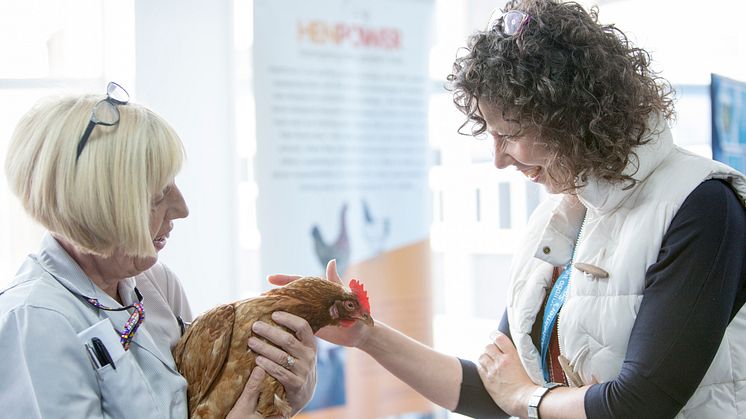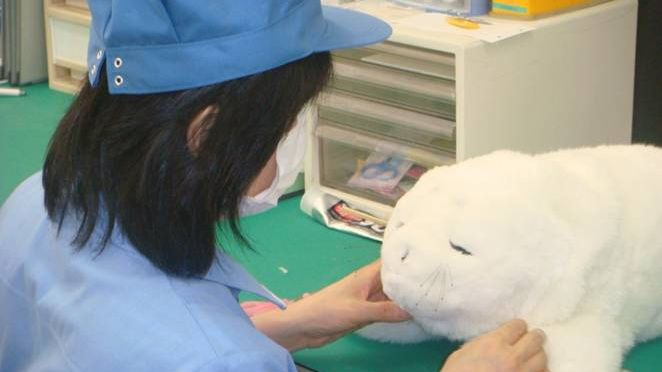
Press release -
Making sure life doesn’t stop when dementia begins
Northumbria University is showcasing the ways in which its staff and students are working to support people with dementia during a series of events for Dementia Awareness Week.
With estimates that 850,000 are currently living with dementia in the UK, Northumbria University is actively working across a number of sectors and industries to help to deliver improvements and new ways of coping for people with dementia.
The University has been showcasing some of its activities during a series of events across Dementia Awareness Week (18-22 May), which aims to raise awareness and understanding of the condition, as well as promoting ways to live well with dementia.
Northumbria has led studies investigating ways in which animals – both real and robotic – can be used as therapy and is working with public service providers to deliver improvements to housing and care facilities that will help people to live in fit-for-purpose accommodation that will adapt to their changing needs.
The Alzheimer’s Society endorses ‘Dementia Friends’ awareness sessions to understand what it is like to live with dementia. At Northumbria, this is a mandatory session for all nursing and operating department practice students before they begin practice to ensure they have insight into what it is like to live with dementia and to see the person, rather than the condition.
Academics are also involved in a number of arts and cultural projects to bring awareness of the condition and its impact to a broad cross section of society.
Dr Cathy Bailey, a senior research fellow in public health and wellbeing at Northumbria, is co-ordinating the University’s activities around Dementia Awareness Week.
She explained: “While it’s obviously hugely important to continue pumping money into research to find a cure for dementia, it is even more important to invest in ways to help and support those currently coping with dementia today. Quite simply, life doesn’t stop when dementia begins.
“Here in the UK, some 40,000 people under the age of 65 have early onset dementia, and will be coping with the condition while scientists are working to find a cure. That’s why we at Northumbria University are working with a number of external partners to undertake a considerable breadth of dementia-related work.
“This ensures we are innovatively leading the way in enabling people with dementia, their family, carers friends and communities, as well as health and other professionals, to work together to realise optimum quality of life for everyone dealing with this hugely challenging condition.”
Two of Northumbria’s most renowned projects relate to using animals to help to stimulate positive emotions and well-being in people with the condition will be discussed during the week of activities.
The University works in collaboration with Equal Arts on the HenPower project which sees older people and those with dementia living in care homes, looking after hens to provide a stimulating environment that reduces depression and loneliness.
Another study has revealed that therapeutic robotic animals have a positive effect on quality of life and reduced displays of anxiety. Using ‘PARO’ – a robotic harp seal fitted with artificial intelligence software and tactile sensors that allow it to respond to touch and sound, as well as showing emotions – the researchers found that the robots had a positive and clinically meaningful influence on quality of life, as well as reducing displays of anxiety and increasing levels of pleasure.
The week began with an exhibition of these and other activities offered by Northumbria, as well as a discussion and exhibition of products designed by students that can help to stimulate people with dementia.
Students from the Design for Industry and Fashion Design and Marketing courses have worked collaboratively to take part in the Northern Housing Consortium’s Designed for Life competition to stimulate thinking as to how we could design homes, neighbourhoods, offices, products and services that better meet the needs of those living with dementia.
Senior design lecturers took part in discussions about some of the household and garden products the students have developed, including innovative social initiatives, seed-holders that attract birds and wildlife to gardens and specialist lighting that simulates sunrise to rouse the senses.
Other activities held during the week have included open sessions for staff to become Dementia Friends, a celebration of Dementia Champions, a ‘Wear Denim for Dementia’ day and a ‘Baking for the Brain’ cake baking competition with prizes provided by many leading regional organisations.
The recent Research Excellence Framework exercise ranked Northumbria in the top quartile in the UK for its research power in the area of Allied Health and Nursing, with more than 80% of research in this area being rated as world leading or internationally excellent.
More information on Dementia Awareness is available at www.alzheimers.org.uk/remembertheperson
Northumbria is a research-rich, business-focussed, professional university with a global reputation for academic excellence. To find out more about our courses go towww.northumbria.ac.uk
If you have a media enquiry please contact our Media and Communications team at media.communications@northumbria.ac.uk or call 0191 227 4571.













